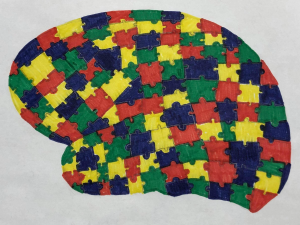 Autism spectrum disorder (ASD) is a debilitating development disorder. Frequent signs include impairments in social interactions and communication, and restricted, repetitive and stereotyped behaviors or interests. Autism is typically diagnosed in ages 2-3 but can sometimes be diagnosed later in life, especially in females. ASD is primarily a genetic disorder but can also be due to mutations. Some of these are:
Autism spectrum disorder (ASD) is a debilitating development disorder. Frequent signs include impairments in social interactions and communication, and restricted, repetitive and stereotyped behaviors or interests. Autism is typically diagnosed in ages 2-3 but can sometimes be diagnosed later in life, especially in females. ASD is primarily a genetic disorder but can also be due to mutations. Some of these are:
Fragile X syndrome – Caused by a mutation in the FMR1 gene which is found on the X chromosome. People have a longer FMR1 in FXS and it cannot produce FMRP which is crucial to brain development. Because of its location on the X chromosome, it is more likely that males are diagnosed with FXS.
Tuberous sclerosis complex – Caused by a mutation in TSC1 or TSC2 which encode a tumor suppressor. Because of this, people with this typically have benign tumors in multiple organs.
Angelman syndrome – A genetic development disorder due to the loss of the gene UBE3A. It is similar to ASD but typically has more severe signs such as seizures, ataxia (lack of coordination), strange fascination in water and more.
Timothy syndrome – Mutation in the CACN1C gene and is also known for its complication in heart problems, digits and malfunction of central and peripheral nervous systems.
Rett syndrome – A gene called MECP2 is supposed to help normalize the function of nerve cells. In ASD, this gene in under expressed and doesn’t work properly.
Due to the increasing diagnoses of ASD, it is important to underst and what is happening deep down. Autism is something that one is born with, but is not diagnosed until certain developmental bench marks are missed. Autism is diagnosed and then a spectrum is used to help define the severity. Some who are high functioning are considered to have Asperger’s. Autism is a complex disease and affects each person differently. However, even though they have a disease, they are still people living their life.
and what is happening deep down. Autism is something that one is born with, but is not diagnosed until certain developmental bench marks are missed. Autism is diagnosed and then a spectrum is used to help define the severity. Some who are high functioning are considered to have Asperger’s. Autism is a complex disease and affects each person differently. However, even though they have a disease, they are still people living their life.
Researchers are continuously searching for ways to help better the lives of those with autism, especially those who are non verbal and cannot express their pain or emotions. Probiotics and changing children’s diets have been found to help behavior and those with autism also suffer from some sort of digestive problem.